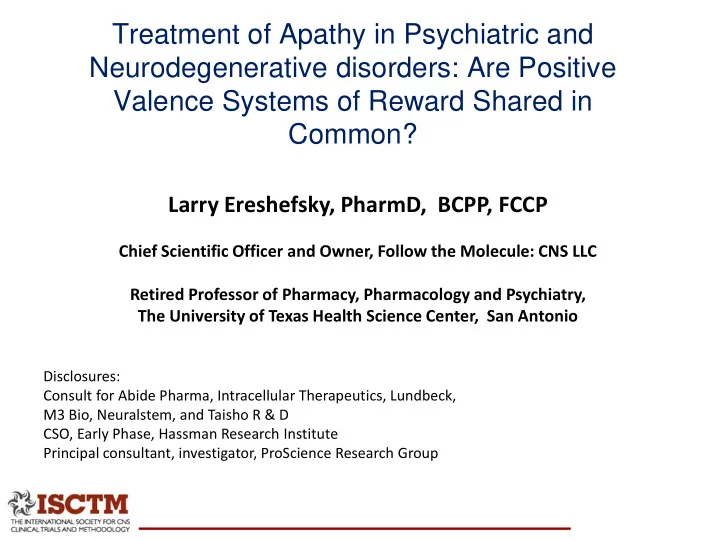

Treatment of Apathy in Psychiatric and Neurodegenerative disorders: Are Positive Valence Systems of Reward Shared in Common? Larry Ereshefsky, PharmD, BCPP, FCCP Chief Scientific Officer and Owner, Follow the Molecule: CNS LLC Retired Professor of Pharmacy, Pharmacology and Psychiatry, The University of Texas Health Science Center, San Antonio Disclosures: Consult for Abide Pharma, Intracellular Therapeutics, Lundbeck, M3 Bio, Neuralstem, and Taisho R & D CSO, Early Phase, Hassman Research Institute Principal consultant, investigator, ProScience Research Group
Research Domain Criteria Matrix A suggested organizational structure for knowledge NIMH RDoC focused on Five Domains: • Negative Valence – responses to aversive situations • Positive Valence – responses to positive motivational contexts • Cognitive Systems • Systems for Social processes–responses to interpersonal settings, perception interpretation • Arousal/Modulatory Systems–activate neuronal systems, maintain homeostatic regulation of systems including energy balance and sleep Regulation of positive valence constructs are not uniquely explained by a single domain Modified from: Behavioral Assessment Methods for RDoC Constructs; August 2016: Report by National Advisory MHC Workgroup on Tasks and Measures for RDoC 2
Applying RDoC (Research Domain Criteria) Strategies to BPSD • Not advocating ‘acceptance’ of RDoC; rather does the framework have utility to understand and advance the treatment of apathy in AD? • “To support an experimental therapeutics approach to interventions and facilitate strategies for translating scientific discovery into novel treatments for psychiatry.” Jill Heemskerk, PhD (Aug 2016) Deputy Director, Division of Adult Translational Research, National Institute of Mental Health, NIH • Growing evidence that alterations in reward processes may underlie motivational and anhedonic symptoms in depression, schizophrenia, early AD, and Parkinson’s Positive Valence domain 1. Reward Responsiveness 2. Reward Learning 3. Reward Valuation • How can we expand our growing understanding of ‘transdiagnostic’ psychiatric symptoms to inform development of novel treatments for BPSD? (PLOS ONE | DOI:10.1371/journal.pone.0157084 June 14, 2016). https://www.nimh.nih.gov/about/advisory-boards-and groups/namhc/reports/rdoc_council_workgroup_report_153440.pdf
• While definitions are overlapping and terminology is inconsistently used, ‘apathy/amotivational/anhedonic‘ symptoms are present and prominent not only in psychiatric disorders… • Negative symptoms , ISCTM/ECNP Sept 1, 2017 Stephane Pollentier, Boehringer Ingelheim, ECNP Experimental Medicine Network Validation of Reward Processing tasks, 15 th March 2017 4
… but also in neurodegenerative disorders (typically under an apathy umbrella ) … • Apathy is related to reduced VTA function in Early AD with frontotemporal degeneration and subjective cognitive impairment (n=54); • Apathy is linked to medial frontal areas in Probable AD (n=41) • Both studies implicate the motivational DA network 5
Lack of precision in the use of Anhedonia, Amotivation, Apathy: Behaviorally (psychodynamically) Differentiated -- Yet are they Inter-related at a Neurocircuitry, Brain Function Level? Stephane Pollentier, Boehringer Ingelheim, ECNP Experimental Medicine Network 6 Validation of Reward Processing tasks, 15 th March 2017
MBI Do early stage patients with AD, i.e., MBI or MCI, (biomarker positive) manifest the same reward neurocircuitry dysfunction (fMRI, rsMRI, connectivity, ERP), transmitter/receptor dynamics, and response to drugs as psychiatric patients? Could we screen new treatments in early stage illness to increase success of later phase studies in AD?
Treatment of Apathy in Psychiatric and Neurodegenerative disorders: Are Positive Valence Systems of Reward Shared in Common? • If reward processing circuitry activity changes, linked to the generation of motivational states, overlap for CNS disorders, then would pseudo-specificity concerns be allayed, i.e., apathy improvement and cognition? • What about pharmacological specificity, i.e., dopaminergic interventions? • The differing dynamics of dopamine concentration during reward learning, tonic (reward prediction errors) vs phasic (reward value) • D1 vs D2 signaling, PDE10a inhibitors • If we can demonstrate target engagement with a ‘logical’ mechanism of action; • Show the intervention causes a change in relevant brain activity or mental process; and • Show that the intervention is associated with beneficial changes in the clinical phenomenon of relevance, then would we be on the path of de-risking drug development for Apathy in dementia? • How might this construct inform the path forward to accelerate drug development ? ( Experimental Therapeutics Approach to Interventions, Sarah H. Lisanby, M.D., Director, Division of Translational Research, https://www.nimh.nih.gov/outreach/coalition/coalition- for-research-progress-meeting-summary-march-30-2017/index.shtml) Martins et al. Neuroscience and Biobehavioral Reviews 80 (2017) 351–371
RDoCs Style Anhedonia ‘Fast-Fail’ Early Phase Development Study in Early MCI with Apathy (Decreased Motivation/Indifference) Early MCI meeting Apathy Diagnostic Criteria Key secondary Behavioral intermediate phenotype assessment Screening/Subject enrichment? (more closely linked to neural circuitry than clinical Subjects able to perform reward tasks outcome but also linked to clinical outcome) Patients functioning below age-matched norms Probabilistic Reward Task assesses capacity to learn Pharmacological challenge strategy based on reward Clinical Outcome: Measured with clinical I/E: Behavioral symptoms sufficient to produce scales: NPI Apathy, CGIC minimal impairment; BPSD not attributable to current psychiatric disorder Cognition measure Does not meet criteria for any Dementia What would be a functional measure in early MCI for a short Early Phase trial? Presence/absence of depression Primary: Circuit measure of expected effect of Exploratory: Additional circuit measure drug on the brain QEEG measures, ERP, Measure engagement of circuitry related to hedonic Effort Expenditure for Rewards Task assesses experience/ motivational responses, i.e., Monetary the degree to which one is motivated by Incentive Delay. reward as demonstrated by effort DMN/Connectivity Experimental Therapeutics Approach to Interventions, Sarah H. Lisanby, Director, Division of Translatl Research https://www.nimh.nih.gov/outreach/coalition/coalition-for-research-progress-meeting-summary-march-30-2017/index.shtml) 9
Recommend
More recommend